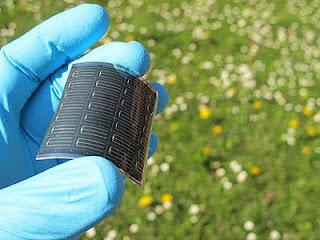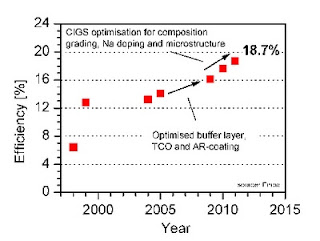High-performance flexible and lightweight solar cells, say, on plastic foils, have excellent potential to lower the manufacturing costs through roll-to-roll processing and the so called “balance-of-system†cost, thus enabling affordable solar electricity in the near future. Thus far, however, flexible solar cells on polymer films have been lacking behind in performance compared to rigid cells, primarily because polymer films require much lower temperatures during deposition of the absorber layer, generally resulting in much lower efficiencies.
Record-breaking team
The research team at Empa's Laboratory for Thin Film and Photovoltaics, led by Ayodhya N. Tiwari, has been involved in the development of high-efficiency CIGS solar cells on both glass and flexible substrates with a special focus on reducing the deposition temperature of the CIGS layer. The group has repeatedly increased efficiency of flexible CIGS solar cells over the past years â€" first at ETH Zurich and now since three years at Empa. With their current record value of 18.7% Tiwari and his team nearly closed the efficiency gap to cells based on multi-crystalline silicon (Si) wafers or CIGS cells on glass. The scientific details of their novel low-temperature deposition technology and the multi-layered device have recently been published in “Nature Materialsâ€.

Flexible CIGS solar cells developed at Empa.

Improvement in energy conversion efficiency of flexible CIGS solar cells on polymer film lead to the world record efficiency of 18.7% for flexible CIGS solar cells developed at Empa.“To achieve such high efficiency values, we had to reduce the recombination losses of photo-generated charge carriersâ€, said Tiwari. CIGS layers grown by co-evaporation at temperature of around 450 °C have a strong composition grading because of inadequate inter-diffusion of intermediate phases and preferential diffusion of gallium (Ga) towards the electrical back contact
To overcome this problem doctoral students Adrian Chirilã and Patrick Bloesch developed novel processes for optimizing the solar cell performance. To achieve an appropriate composition profile in the CIGS layer â€" for enabling more efficient charge carrier collection and reduced interface recombination â€" Chirilã and colleagues developed an innovative growth process by carefully controlling the Ga and indium (In) evaporation flux during different stages of the evaporation process.
High-efficiency solar cells â€" grown on cheap metal-foils
Such high-efficiency CIGS solar cells up to now were developed only on glass substrates with processes where CIGS layers are grown at temperatures of 600 °C or above. In contrast, polymer foils cannot withstand such high temperatures.
The low-temperature process now developed by Tiwari and Co. not only yielded an 18.7%-efficiency cell on polymer foils but also another record efficiency of 17.7% on steel foil without any diffusion oxide or nitride barrier layer commonly used in high-temperature processes.
Both efficiencies were independently certified by the Fraunhofer Institute for Solar Energy Systems (ISE) in Freiburg, Germany. “We have thus shown that this low-temperature process is also applicable on low-cost metal foils such as aluminum or Mild-steel, achieving comparably high-efficiency cells and indicating a severe cost reduction potential with this technologyâ€, said Tiwari.
Scientists at FLISOM, a start-up company, and Empa have been collaborating to further develop low-temperature processing, and FLISOM is scaling up the technology for roll-to-roll manufacturing of monolithically interconnected solar modules and commercializing the technology. The research has been supported by the Swiss National Science Foundation (SNSF), the Commission for Technology and Innovation (CTI), the Swiss Federal Office of Energy (SFOE), EU Framework Programmes as well as by Swiss companies W. Blösch AG and FLISOM.
Further Information: Prof. Dr. Ayodhya N. Tiwari, Thin Film and Photovoltaics, Tel. +41 58 765 41 30 ayodhya.tiwari@empa.ch
Editor / Media contact, Dr. Michael Hagmann, Communication Dept. Tel. +41 58 765 45 92 redaktion@empa.ch
